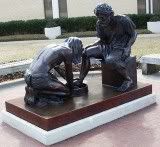THOMAS BOSTON'S PASTORAL HEART
 I am currently reading Thomas Boston's Human Nature in Its Fourfold State. I remember Dr. Hannah saying in class that he considered Boston's book one of the best works on biblical anthropology ever written. Jonathan Edwards called him "a truly great divine." I am a couple chapters in now, and I must say, Boston is superb.
I am currently reading Thomas Boston's Human Nature in Its Fourfold State. I remember Dr. Hannah saying in class that he considered Boston's book one of the best works on biblical anthropology ever written. Jonathan Edwards called him "a truly great divine." I am a couple chapters in now, and I must say, Boston is superb.For a long time it looked as if nothing could be done. Work and prayer seemed to be well-nigh powerless. Amid that sea of hills, as Ettrick has been called, Boston had taken arms against a sea of troubles, and nothing but deep conviction that his call had been of God could have upheld him through his earlier ministry. The little flock at Simprin [where he had previously labored] had been ignorant, but, at least, they had received with meekness the engrafted word. Ettrick was very liberal to its poor, and very hospitable to the passing stranger; but it was full of pride, and self-assurance, and conceit [much like our communities today I think]--the frequent offspring of an isolated life . . . A four years' vacancy [of a parish minister] had wrought its natural effects. Men had grown careless. They had lost the art of decent attention during service. They gossiped and chaffered so noisily in the churchyard in time of sermon, that one of the elders had to be told off to keep order there. Worse, too, than any inattention was the so lax morality. The vice of swearing was widespread. And one has but to turn the pages the old Session Records to be ashamed at the prevalent uncleanness. No wonder Boston was made to go with a bowed-down back. No wonder that after eight years of it he said to his wife, 'My heart is alienated from this place.' At times he was filled with the longing to be gone. And it is characteristic of his large and loyal heart, that nothing so speedily subdued that longing as the thought of the sad plight of Ettrick if he went.
But in the long-run, faith and prayer and study will tell. And as they had told in Simprin they were to tell in Ettrick too. It is not every minister who grows and deepens amid unsympathetic people. It is not every father who abounds in thankfulness when called to meet the bitterest sorrows of the home. Boston did both. And the artless story of his study and his preaching and his daily wrestling with God, surrounded and shadowed as he was, is one of the noblest records that was ever penned. Slowly and surely his influence grew. Gird as they would, men felt the thrust and power of his preaching, and knew the Holy Ghost was in it. One of his action sermons had been published, and word began to steal into the valley that it was making a deep impression in Edinburgh. Strange faces became common in the church. Then came the inevitable calls. And Ettrick grew convinced at last--and the conviction had taken ten years to ripen--that in losing Boston they would lose an incomparable minister. It is touching to note the outbreakings of a rough affection, and to find a congregational fast appointed by the Session, when in 1716 Boston came under call to Closeburn. It is touching, too, and something more, when we remember what the past had been, to mark how Boston, in Presbytery and Synod and Assembly, battled against the call, and how at last he won. It was the turning-point in the parish life. Henceforth he was to minister with new authority, and to be the instrument of far larger blessing.



No comments:
Post a Comment